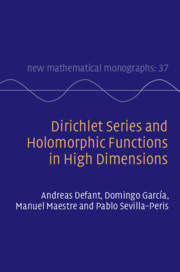Book contents
- Frontmatter
- Contents
- Introduction
- Part 1 Bohr’s Problem and Complex Analysis on Polydiscs
- 1 The Absolute Convergence Problem
- 2 Holomorphic Functions on Polydiscs
- 3 Bohr’s Vision
- 4 Solution to the Problem
- 5 The Fourier Analysis Point of View
- 6 Inequalities I
- 7 Probabilistic Tools I
- 8 Multidimensional Bohr Radii
- 9 Strips under the Microscope
- 10 Monomial Convergence of Holomorphic Functions
- 11 Hardy Spaces of Dirichlet Series
- 12 Bohr’s Problem in Hardy Spaces
- 13 Hardy Spaces and Holomorphy
- Part 2 Advanced Toolbox
- Part 3 Replacing Polydiscs by Other Balls
- Part 4 Vector-Valued Aspects
- References
- Symbol Index
- Subject Index
10 - Monomial Convergence of Holomorphic Functions
from Part 1 - Bohr’s Problem and Complex Analysis on Polydiscs
Published online by Cambridge University Press: 19 July 2019
- Frontmatter
- Contents
- Introduction
- Part 1 Bohr’s Problem and Complex Analysis on Polydiscs
- 1 The Absolute Convergence Problem
- 2 Holomorphic Functions on Polydiscs
- 3 Bohr’s Vision
- 4 Solution to the Problem
- 5 The Fourier Analysis Point of View
- 6 Inequalities I
- 7 Probabilistic Tools I
- 8 Multidimensional Bohr Radii
- 9 Strips under the Microscope
- 10 Monomial Convergence of Holomorphic Functions
- 11 Hardy Spaces of Dirichlet Series
- 12 Bohr’s Problem in Hardy Spaces
- 13 Hardy Spaces and Holomorphy
- Part 2 Advanced Toolbox
- Part 3 Replacing Polydiscs by Other Balls
- Part 4 Vector-Valued Aspects
- References
- Symbol Index
- Subject Index
Summary
Given a family of formal power series, its set of monomial convergence is defined as those z’s for which the series converges. The main focus is given to the sets of monomial convergence of the m-homogeneous polynomials on c0 and of the bounded holomorphic functions on B_{c0}. The first one is completely described in terms of the Marcinkiewicz space l_{(2m)/(m-1), ∞}. For the second one there is no complete description. If z is such that limsup (log n)^(1/2) ∑_j^n (z*_j)^{2} < 1 (where z* is the decreasing rearrangement of z), then z is in the set of monomial convergence of the bounded holomorphic functions. Also, if z belongs to the set of monomial convergence, then the limit superior is ≤ 1. This is related to Bohr’s problem (see Chapter 1). First of all, if M denotes the supremum over all q so that l_q is contained in the set of monomial convergence of the bounded holomorphic functions on Bc0, then S=1/M. But this can be more precise: S is the infimum over all σ >0 so that the sequence (p_n^(-σ))_n (being p_n the n-th prime number) belongs to the set of monomial convergence of the bounded holomorphic functions on Bc0.
Keywords
- Type
- Chapter
- Information
- Dirichlet Series and Holomorphic Functions in High Dimensions , pp. 230 - 267Publisher: Cambridge University PressPrint publication year: 2019



